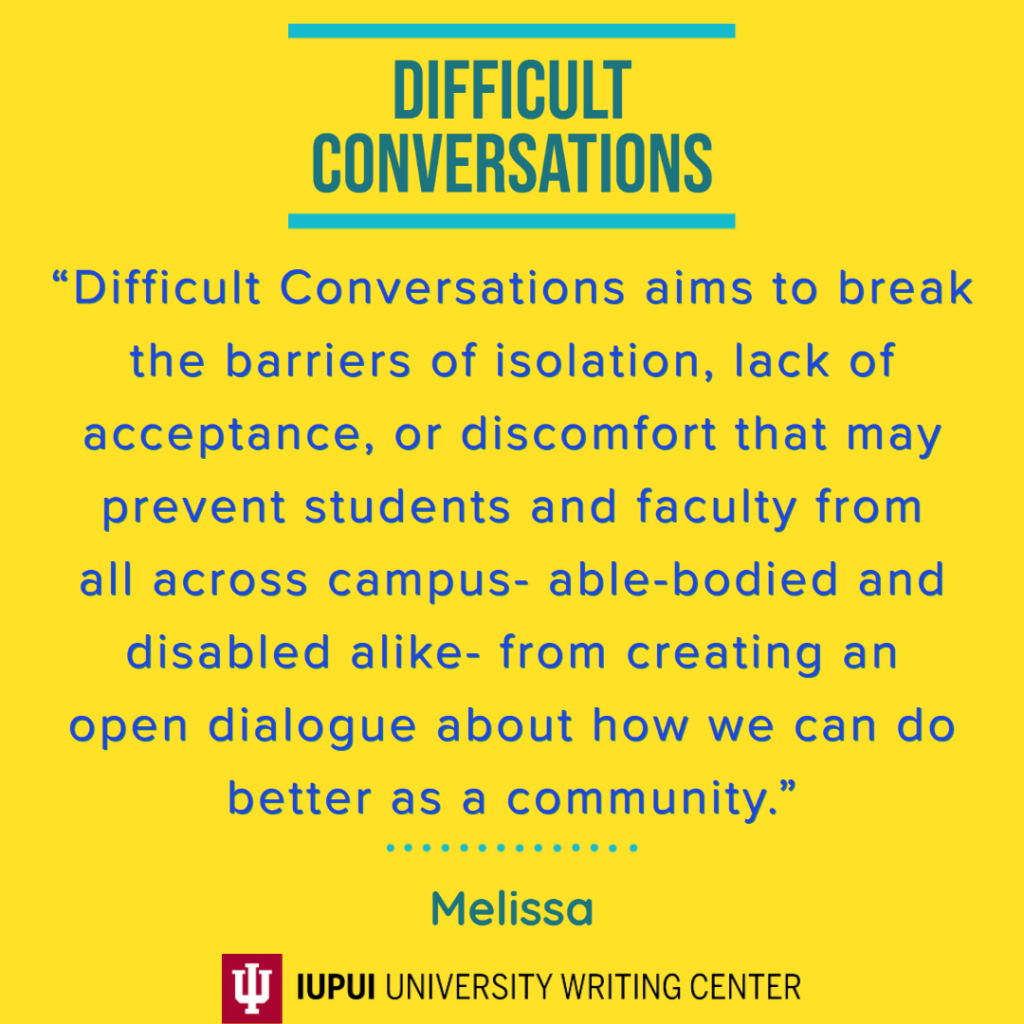by Melissa Thomas

When I came to the Writing Center during my first semester at IUPUI, I did not consider myself to be a leader, or even a strong communicator. I just knew that I loved writing, and I loved the community that the UWC had built. So, I was fairly surprised to find myself discussing complex topics such as “disability justice” and “linguistic diversity” within my first year as a Writing Center consultant. Through Difficult Conversations, I have engaged with co-workers, students, and faculty members of IUPUI in ways that are the least expected, and the most rewarding.
According to the 2018 IUPUI Campus Climate Survey, 17% of students at IUPUI have a disability. This percentage steadily increased from 2014, but it may not take into account students who choose not to report their disability or who do not have the resources to be tested. As someone who works with students one-on-one each day, I always try to keep in mind that the writer I am working with may be one of those students. This brings up the question, “How can I be more accommodating as a consultant?”
Similar questions are echoed across campus positions including student employees, faculty members, academic advisors, university programmers and more. By connecting these members across the IUPUI campus through their shared desire for community progress, Difficult Conversations intertwines the individual and institutional narratives of IUPUI.
Although I research and develop the materials for Difficult Conversations, I am often pleasantly surprised by the questions that other members of the IUPUI bring to the conversation. We may begin our discussion with questions like “How can we read writing that is aware of social habitus, but does not assess based on them?” and “What is the dominant script for disability, especially mental illness?”.
This could be followed by community questions of “Why do these inaccessibilities exist?” and “How can we address it as a community?” Despite preparations for this workshop, the conversation always branches off in ways I least expected it. This is what makes Difficult Conversations so unique for me: sharing and engaging with community voices across the IUPUI campus.
Difficult Conversations is often centralized around a piece of rhetoric that connects to our overarching theme. It is optional for all attendees to read the ‘book’ of the semester before each event, but unique knowledge still branches when others come in with different pieces of literature, past experiences, and personal narratives in mind.
In the past, Difficult Conversations has covered topics such as anti-racist writing in classrooms (Spring 2021), linguistic justice (Fall 2020), multilingual writers (Spring 2020), student disclosure of mental health (Fall 2018), and creating spaces for LGBTQ+ writers (Fall 2018).
This year, we are focusing on the topic of disability justice and accessibility in both the classroom and the writing process. This subject has become especially relevant as we transition into our third year of studying during a pandemic. We discussed “Mad at School” during the fall semester, the first work in disability studies to engage in discussing the impact of mental illness in higher academic settings. We are continuing the topic in the spring semester, following “Promoting Inclusive Classroom Dynamics in Higher Education” by Kathryn Oleson.
Difficult Conversations aims to break the barriers of isolation, lack of acceptance, or discomfort that may prevent students and faculty from all across campus- able-bodied and disabled alike- from creating an open dialogue about how we can do better as a community. These inclusive dynamics drive our discussion, and removing prejudices about disability with an open mind will have a direct influence on the inclusivity of our campus.
Not all disabilities are visible, but they can still influence the writing and learning process that our current academic structures do not address in an accessible way. Therefore, discussing disability can improve the academic experience for students and faculty alike. I personally have already witnessed a few changes in our past conversations.
Please join us for Difficult Conversations!

